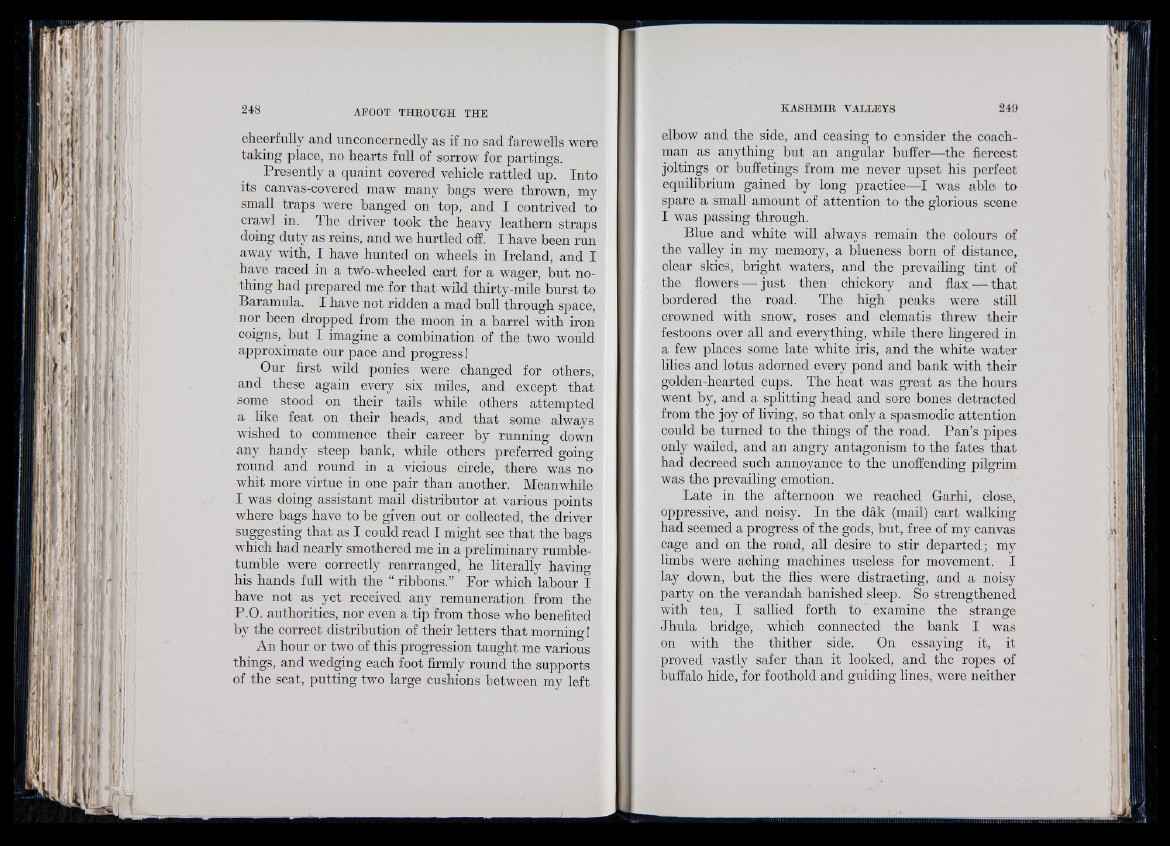
cheerfully and unconcernedly as if no sad farewells were
taking place, no hearts full of sorrow for partings.
Presently a quaint covered vehicle rattled up. Into
its canvas-covered maw many bags were thrown, my
small traps were banged on top, and I contrived to
crawl in. The driver took the heavy leathern straps
doing duty as reins, and we hurtled off. I have been run
away with, I have hunted on wheels in Ireland, and I
have raced in a tw'o-wheeled cart for a wager, but nothing
had prepared me for that wild thirty-mile burst to
Baramula. I have not ridden a mad bull through space,
nor been dropped from the moon in a barrel with iron
coigns, but I imagine a combination of the two would
approximate our pace and progress!
Our first wild ponies were changed for others,
and these again every six miles, and except that
some stood on their tails while others attempted
a like feat on their heads, and that some always
wished to commence their career by running down
any handy steep bank, while others preferred going
round and round in a vicious circle, there was no
whit more virtue in one pair than another. Meanwhile
I was doing assistant mail distributor at various points
where bags have to be given out or collected, the driver
suggesting that as I could read I might see that the bags
which had nearly smothered me in a preliminary rumble-
tumble were correctly rearranged, he literally having
his hands full with the “ ribbons.” For which labour I
have not as yet received any remuneration from the
P.O. authorities, nor even a tip from those who benefited
by the correct distribution of their letters that morning!
An hour or two of this progression taught me various
things, and wedging each foot firmly round the supports
of the seat, putting two large cushions between my left
elbow and the side, and ceasing to consider the coachman
as anything but an angular buffer—the fiercest
joltings or bufferings from me never upset his perfect
equilibrium gained by long practice—I was able to
spare a small amount of attention to the glorious scene
I was passing through.
Blue and white will always remain the colours of
the valley in my memory, a blueness born of distance,
clear skies, bright waters, and the prevailing tint of
the flowers — just then chickory and flax — that
bordered the road. The high peaks were still
crowned with snow, roses and clematis threw their
festoons over all and everything, while there lingered in
a few places some late white iris, and the white water
lilies and lotus adorned every pond and bank with their
golden-hearted cups. The heat was great as the hours
went by, and a splitting head and sore bones detracted
from the joy of living, so that only a spasmodic attention
could be turned to the things of the road. Pan’s pipes
only wailed, and an angry antagonism to the fates that
had decreed such annoyance to the unoffending pilgrim
was the prevailing emotion.
Late in the afternoon we reached Garhi, close,
oppressive, and noisy. In the dak (mail) cart walking
had seemed a progress of the gods, but, free of my canvas
cage and on the road, all desire to stir departed; my
limbs were aching machines useless for movement. I
lay down, but the flies were distracting, and a noisy
party on the verandah banished sleep. So strengthened
with tea, I sallied forth to examine the strange
Jhula bridge, which connected the bank I was
on with the thither side. On essaying it, it
proved vastly safer than it looked, and the ropes of
buffalo hide, for foothold and guiding lines, were neither